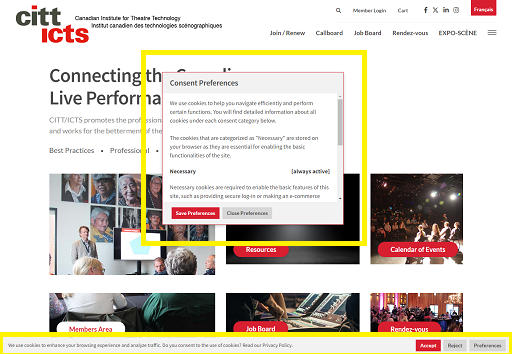You may have noticed that many web sites these days warn you that they are using cookies, often with a pop-up banner or dialog that interrupts your use of the site. These dialogs may ask you to consent to their use of cookies, and they might even give you options to micromanage the cookies they use to track you. Or they might just flatly state that they are using cookies, and force you to acknowledge that to continue.
What is going on here?
Firstly, what are these cookies they are referring to? A cookie is a small piece of data that follows you around as you use a web site. It is useful for remembering things about you, such as the fact that you are logged in, or have something in the shopping cart that is awaiting checkout. But they can also be used simply to snoop on what you are doing.
Web site analytics packages (such as Google Analytics) try to collect data not just about which pages you visit, but the order you visited them, how long you spent at each one, which one you started on, and where your visit ended. This can be useful to marketers and advertisers to determine if their efforts to guide you toward a specific outcome are successful. But it can also be intrusive and not respectful of your privacy.
For that reason, some government agencies have introduced laws (such as the EU Cookie Law, and Quebec Law 25) to increase transparency around cookies and how they are used to track your online movements. Under these laws, if a website uses cookies to collect information about you and your use of the site, it must state so right up front, and give you the ability to opt out if you don't want to be tracked.
Declining Cookies
What happens if you opt out of being tracked? For cookies that collect marketing and website usage data, there is usually no harm in opting out. It will make the web site's usage statistics a little less precise, and may block some of the more advanced tracking analytics, but those outcomes generally do not affect the user's experience.
Some cookies are essential to the functioning of the web site, however. Previously mentioned were cookies that track the fact that you are logged in, or are in the middle of a purchase. Without cookies, you could get booted out of the private areas of the site, or lose your purchase. Such cookies are called "essential cookies" and if you decline those cookies, some web site features will simply break. For that reason, some sites will not let you opt-out of essential cookies. Others may allow it, but will warn you of the consequences.
Do you need a Cookie Consent Dialog on your site?
Here is a simple checklist:
- do you use cookies to track the movements of your visitors and collect that data for later analysis? (If you use Google Analytics, Google Adwords, or other online advertising services, then the answer is yes.)
- do you do business in the E.U., Quebec, or any other jurisdiction that requires consent to track peoples' online movements or otherwise collect personal information about how they use your online services?
If you checked both, then yes, you need consent to track your visitors. You can either implement a cookie consent dialog, or you can remove the tracking software you use. For instance, if you use Google Analytics, you can can remove that from your site, replacing it with a non-cookie alternative, if necessary. If that was the only source of tracking cookies, you would then be in the clear.
If you do business in the E.U. or Quebec but do not use cookies to track your visitors' web usage habits, then there is nothing to get consent for. You are in the clear. If you use any essential cookies to provide important website functions, it is nevertheless a good idea to explain that in your privacy policy.
If you do use cookies to track your visitors, but you are not involved with business in the E.U. or Quebec, then you can probably relegate the topic to your privacy policy for now. But these laws are becoming more commonplace, so you should be prepared in any case for a time when you may need to get explicit consent.

